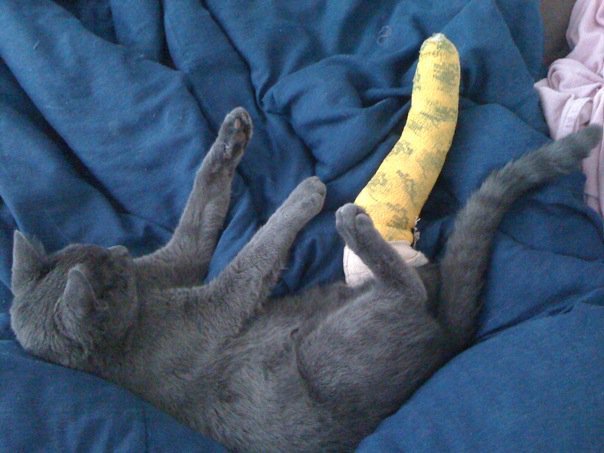QuestionHello Ali,
I have a question about the survival rate of fostered kittens. How often do mother cats and kittens not survive in foster care? Below provides a bit of background to my question..
Our family decided to foster cats this past January '08. We have fostered four different times but unfortunately most of the cats have died. The first cat stayed with us for 8 weeks and turned out not to be pregnant so we returned her - after treating her for a URI she was healthy. The second cat had four newborn kittens and after day 4 and bloody diarrhea we took her back to the vet and we were told she had distemper and would be euthanized. We waited four months and cleaned and bleached our home as best we could and brought home a third cat with five kittens approx. four weeks of age. The mother seemed to lose her appetite and thirst by day 7, developed diarrhea and died in our home by day 9 - we took the kittens back to the shelter and were told they also all died three days later. This past few weeks we fostered 6 newly orphaned kittens approx. 6 weeks of age. We cared for them in a completely different room. They were diagnosed with a parasite and receiving treatment for it. By day 5, two were not eating and drinking that great and one died by day 9. We decided to take the remaining five back to the shelter as they had had ongoing diarrhea for over two weeks ad I was concerned about their hydration.
We enjoy cats and want to care for them but are very surprised and saddened by these experiences - is it our home from the cat that had distemper? or is it just one of those unknowns and we seem to be getting cats that have unfortunate deadly diseases?
I would appreciate any comments you have regarding our expectations for fostering mothers and their babies.
Sincerely,
K
Answerlitter boxes,
Given the background that you have provided I would suggest that you look around your home...How do you clean the food & water dishes and litter boxes in between cats/nursing moms with litters? How thorough are the health checks prior to the cats being released to you? Given that you mention cleaning up after each cat using a bleach solution I wouldn't expect any contagions to be passed on, at least in my experience.
Distemper is an extremely serious and often fatal viral infection that can show mild to severe symptoms. This infection is usually prevented by routine vaccines. Distemper is quite a tough virus which means that it can survive for substantial amounts of time in the right environment. Honestly, with health moms and their litters the survival rate should be close to 100% in my experience. Orphaned kittens can have a lower survival rate and not all deaths are easily explainable. As far as I am aware a 5:1 bleach solution with a tablespoon of liquid dish soap will be effective for disinfecting your home. It is important to use bleach, regular laundry detergent and the hottest water possible when washing any bedding between cats to prevent the spread of disease. Food & water dishes and the litter boxes should all be disinfected by using the bleach, water and dish soap formula to prevent the spread of any infections. Thoroughly disinfecting your whole house is impractical. I strongly suggest that hygiene such as washing your hands in hot soapy water or using hand sanitizer prior to handling any foster cats/kittens/nursing mom and litters as well as doing so afterwards is a simple step that can be used as an effective tool to prevent the spread of viral or bacterial infections.
It is also of the utmost importance to keep any cats that you may foster isolated from one another. This doesn't mean that you should ignore the cats or kittens, it means that you should be conscious of hygiene and the ease that infections can be passed on with. It is extremely important to thoroughly clean the rooms that your foster kitties are living in with the bleach solution from top to bottom so that the next residents won't contract any illnesses that previous foster kitties have had. The main thing to remember is that most viral and bacterial infections aren't strong enough to withstand consistent hand washing. It is important to use the bleach solution to completely disinfect the rooms that cats live in while in your home. Any bedding that you provide for the cats must be washed in hot water with a bit of bleach and regular laundry detergent weekly or sooner if it is soiled which will help to ensure that the cats have the best opportunity to be as healthy as possible. Litter boxes should also be completely disinfected every week with the bleach solution. If the foster cats are staying for longer than 3 weeks it is a good idea to take the cats into the bathroom (hard surfaces are easier to clean), clean their whole room from top to bottom and rinse well. It's a good idea to open a window if possible to provide proper ventilation to remove the smell from the room. If you are fostering more than one mom and her babies it is a good idea to house the second mom and her kittens separately from the first in a room that is easy to clean and made up mostly of hard surfaces. Food, and water dishes must be thoroughly washed and disinfected daily.
I have fostered quite a number of cats and kittens and I believe that the reason your fatality rate with moms and babies is possibly related to the distemper virus still being present somewhere in your home. I also wonder if the cats that you fostered were given a complete physical exam and blood work to ensure that everything was okay with their health.
Cats that have been exposed to panleukopenia (medical term for distemper) can start off by showing signs of illness that are quite general. The initial signs that a cat may have been exposed to distemper include a lack of appetite, lethargy, and fever (approximately 106 Fahrenheit, normal body temperature is between 100.3 - 102.5 Fahrenheit). It's not uncommon to see vomiting, drooling and severe case of diarrhea that may have blood in it. These signs of illness can result in dehydration quite quickly. A simple way to check that your cat is hydrated is by gently lifting the extra skin on the scruff slightly and let it go. If the skin doesn't snap back quickly then urgent veterinary treatment and fluid therapy is required.
It's quite common to see a cat with distemper hunched over the water bowl and not seeming to have the energy or strength to leave the water. Distemper affects each cat or kitten differently. If a cat's body temperature drops below normal they will usually slip into a coma and die. Cats that manage to fight off this viral infection and recover will take a period of several weeks to recover completely. The symptoms of distemper are quite recognizable to vets but there is no joy in making such a diagnosis.
If a cat has or is at risk for feline leukemia or FIV, (both chronic health problems that are immune similar to the way that HIV and AIDS in people)or any other medical problems are much more susceptible to distemper. Cats with distemper have fairly specific symptoms that a qualified vet would easily recognize during a complete physical exam, and given that distemper is so contagious I would think that cats or kittens would be given blood tests to be absolutely sure that they aren't carrying distemper prior to being placed in a foster home. The younger a kitten is the more likely they are to die if they are exposed to distemper.
According to my research cats older than 5 months of age or so are more likely to survive distemper provided that they receive appropriate supportive care including IV fluids to maintain hydration and a broad spectrum antibiotic to help prevent secondary infections from developing. distemper is a viral infection which means that antibiotics won't have any effect on distemper the reason that antibiotics are recommended in this situation is to try and prevent secondary bacterial infections from developing. Supportive care is quite important in terms of providing the best possible chance for a cat to survive. Common therapies that a vet can use to help improve a cat's chances of survival include medications to control vomiting and diarrhea as well as IV fluids to combat dehydration. Cats that may have distemper must be kept isolated to prevent the possibility of passing distemper along to healthy cats. Disinfecting an area that cats that have had distemper thoroughly is another important step towards preventing further spread of this infection. Cats that do recover from distemper can still pass it along to other cats for a significant amount of time because the virus can still be found in their urine and feces so it is still important to keep them isolated for about 6-8 weeks after recovering from the acute phase of distemper.
Vaccines are an important way to prevent distemper infection especially in an animal shelter or rescue organization since the cats aren't often brought in with any medical history. Newer research has made some connections to vaccines causing or contributing to auto immune responses that increase a cat's risk of developing kidney failure. There is also some suggestion that certain components of vaccines can cause some forms of cancer. The University of Guelph is conducting a study that may completely change the way that vaccines are administered. My vet has informed me that so far this research suggests we are over vaccinating our pets. It is believed that this constant over stimulation of the immune system could potentially cause the immune system to attack and damage the kidneys which usually leads to kidney failure which is a common chronic health issue in middle aged or senior cats. There is some information to support the potential for some vaccines to be related to some types of cancer. It is being suggested that we seriously over vaccinate our cats and that it isn't necessary to vaccinate every year. The only mandatory vaccine is rabies and the laws surrounding the vaccine status of household pets varies from municipality to municipality. A vet can determine the level of a cat's immunity to illnesses that are routinely vaccinated against by taking a blood sample and measuring the blood titers which are indicators of immunity. The draw back to this test is that it is currently quite expensive. As of a few years ago my family vet started recommending that I cycle my cat's vaccines which means that cats don't necessarily get all vaccines annually. The idea behind this strategy is to prevent cats from developing auto immune reactions that attack their kidneys as well as trying to prevent tumors from developing.
I would suggest that the room that you use to isolate foster kitties (isolation is just a suggestion for further reference in order to have more control to prevent spread of disease and allow you to check on the cats regularly) not have carpeting, draperies or other soft surfaces that can hold onto viral/bacterial infections. I would recommend that for bedding you only use towels that are relatively cheap because you will need to wash them in the hottest possible water and add about 1/2 cup of bleach to the wash cycle in addition to the detergent. When it comes down to disinfecting your household after sick cats and kittens have been there I would recommend that you mix up a solution of 5 parts water to one part bleach and scrub this room thoroughly from ceiling to floor. This should ensure a clean environment, I do however recommend that you rinse all surfaces in the room very well to prevent the smell of bleach from irritating the cats or kittens that you may foster in the future. Once the room has been washed down with bleach and rinsed well with clean water any infection that may have been present should be completely gone. Be sure to soak litter boxes and food and water dishes in the 5:1 bleach solution as the infection may have survived on these surfaces and been accidentally passed on.
I truly hope that you will be able to foster other moms with litters once you have completely gone through your home and disinfected anything that the cats with distemper may have come into contact with. I know that it sounds like a ton of work, but I have the feeling that you will be able to foster your cats successfully with a substantially decreased mortality rate...I hope that you have found this information helpful. If you have any further questions or concerns, or you would simply like to send an update or some pictures my way, please don't hesitate to contact me again.

 Lost Cat questions
QuestionRusty
QUESTION: Ali,
My new
Lost Cat questions
QuestionRusty
QUESTION: Ali,
My new
 Cat behavior question...
QuestionZero the goofball
QUESTION: Hi Kate,
I
Cat behavior question...
QuestionZero the goofball
QUESTION: Hi Kate,
I
 Cats broken leg and aggression
Question
Little Scout
Hello, I wanted to pose a query t
Cats broken leg and aggression
Question
Little Scout
Hello, I wanted to pose a query t
 My cat is jealous of my other cat
QuestionQUESTION: Hi Ali. I hope you can provide
My cat is jealous of my other cat
QuestionQUESTION: Hi Ali. I hope you can provide
 My cats gone missing
Question
Tommy
Hi Jessica,
I do hope that you c
My cats gone missing
Question
Tommy
Hi Jessica,
I do hope that you c